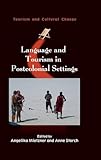Language and Tourism in Postcolonial Settings / Angelika Mietzner, Anne Storch.
Material type: TextSeries: Tourism and Cultural ChangePublisher: Bristol, UK; Blue Ridge Summit, PA : Channel View Publications, [2019]Copyright date: ©2019Description: 1 online resourceContent type:
TextSeries: Tourism and Cultural ChangePublisher: Bristol, UK; Blue Ridge Summit, PA : Channel View Publications, [2019]Copyright date: ©2019Description: 1 online resourceContent type: - 9781845416782
- 9781845416799
- online - DeGruyter
- Issued also in print.
| Item type | Current library | Call number | URL | Status | Notes | Barcode | |
|---|---|---|---|---|---|---|---|
 eBook
eBook
|
Biblioteca "Angelicum" Pont. Univ. S.Tommaso d'Aquino Nuvola online | online - DeGruyter (Browse shelf(Opens below)) | Online access | Not for loan (Accesso limitato) | Accesso per gli utenti autorizzati / Access for authorized users | (dgr)9781845416799 |
Frontmatter -- Contents -- Contributors -- Preface: cape coast caper -- 1. Linguistic Entanglements, Emblematic Codes and Representation in Tourism: Introduction -- 2. Transformations of the 'Tourist Gaze': Landscaping and the Linguist behind the Lens -- 3. Backpacking Performances: An Empirical Contribution -- 4. 'We Have Our Own Africans': Public Displays of Zār in Iran -- 5. Cameras as Barriers of Understanding: Reflections on a Philanthropic Journey to Kenya -- 6. Heritage Tourism and the Freak Show: A Study on Names, Horror, Race and Gender -- 7. Postcolonial Performativity in the Philippine Heritage Tourism Industry -- 8. The Hakuna Matata Swahili: Linguistic Souvenirs from the Kenyan Coast -- Afterword: Between Silence and Noise: Towards an Entangled Sociolinguistics of Tourism -- Bookend: cape ghost -- Index
restricted access online access with authorization star
http://purl.org/coar/access_right/c_16ec
This book focuses on perspectives from and on the global south, providing fresh data and analyses on languages in African, Caribbean, Middle-Eastern and Asian tourism contexts. It provides a critical perspective on tourism in postcolonial and neocolonial settings, explored through in-depth case studies. The volume offers a multifaceted view on how language commodifies, and is commodified in, tourism settings and considers language practices and discourse as a way of constructing identities, boundaries and places. It also reflects on academic practice and economic dynamics in a field that is characterised by social inequalities and injustice, and tourism as the world's largest industry enacting dynamic communicative, social and cultural transformations. The book will appeal to both undergraduate and postgraduate students of tourism studies, linguistics, literature, cultural history and anthropology, as well as researchers and professionals in these fields.
Issued also in print.
Mode of access: Internet via World Wide Web.
In English.
Description based on online resource; title from PDF title page (publisher's Web site, viewed 07. Jul 2020)


